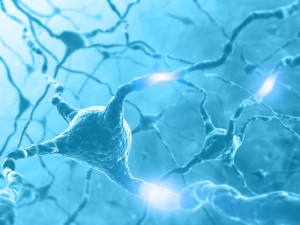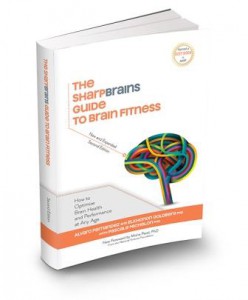4 Essential (and Overlooked) Facts About Your Brain and Your Mind
 An aspiring clarinetist begins by getting a sense of the way the instrument’s sounds are produced by the air she blows through it. A driver must be acquainted with various vehicle fundamentals, such as adding gas, accelerating, and reading the speedometer. It is no different with the brain. Maximizing your brain’s health and performance begins with a basic understanding of how it works and how it evolves across the lifespan.
An aspiring clarinetist begins by getting a sense of the way the instrument’s sounds are produced by the air she blows through it. A driver must be acquainted with various vehicle fundamentals, such as adding gas, accelerating, and reading the speedometer. It is no different with the brain. Maximizing your brain’s health and performance begins with a basic understanding of how it works and how it evolves across the lifespan.
The human brain evolved to help us operate in complex, changing environments by continually learning and adapting. Successfully doing so involves a variety of brain functions and abilities, including various types of memory, language, emotional regulation, attention, and planning. While these functions are often carried out by distinct neural networks, they are fundamentally interdependent and thriving in the environment we face each day depends on the functionality of all these brain functions, whether cognitive, emotional, or executive.
For example, imagine that you are discussing an ambitious new project with a client. The situation is difficult, both because the importance of the deal for your career means you are anxious to close it to your advantage, and because the client is being quite condescending. The pressure to succeed and the need to refrain from getting angry make it hard for you to “stay cool” and think straight. This turns out to be a good illustration of the ways that we depend on “emotional self-regulation”, and demonstrates the fact that emotional and cognitive functions are tightly interconnected.
Brain functions are not fixed at birth or after childhood, as our brains constantly change over a lifetime: over the short term in response to our daily thoughts, sensations, feelings, and actions, as well as over the long term, as we continue growing wiser – and older. The good news is that we are not relegated to passively watching these changes occur. Our brains respond to basic lifestyle factors that we have a large degree of control over, and neuroplasticity (the brain’s lifelong capacity to change and rewire itself in response to stimulation and experience) is at the core of the ability to actively improve specific functions through training. Genetics is not destiny.
In particular, it is important to keep in mind a few fundamental, and often overlooked, facts:
- “Smart pills” simply don’t exist. It would be nice, of course, if we could all just take a pill to quickly and painlessly increase brain health and performance. But, published evidence questions the effectiveness and safety of both supplements and drugs for cognitive enhancement. Now, while evidence that “smart” drugs actually work is scarce at the present, we do have a wide-ranging body of research to support the idea that a few fundamental behaviors have a significant influence on our brain health and fitness, and these include physical and mental exercise and a healthy diet. So why don’t we start there?
- Aging can bring decline… Starting in our late 20’s and early 30’s, research shows that speed of processing and working memory (the type of memory that allows us to both hold information in mind and work on it as needed) tend, on average, to slow down, reducing our capacity to process and deal with complex new information. This is a gradual process that often first becomes noticeable in our early 40’s. However, individuals vary significantly in how and when they experience these decreases: some people experience a significant decline while others do not.
- … and also improvement. On the other hand, even after the brain is fully formed in young adulthood, researchers have found that functions that benefit from accumulated practice, such as vocabulary-related language skills, pattern recognition, and emotional self-regulation, tend to improve decade after decade. In one study for example, researchers asked individuals from three age groups to read stories about intergroup and interpersonal conflicts and predict how these conflicts would unfold. Compared to young and middle-aged people, older people employed higher reasoning schemes that involved multiple perspectives, allowed for compromise, and recognized the limits of knowledge. So, the point is, we need both to nurture our strengths and to address our weaknesses, if we are to maintain peak performance along extended life and career spans.
- “Cells that fire together wire together.” By practicing a skill over and over we stimulate the same neural networks in the brain, resulting in the strengthening of existing connections and the creation of new ones. Over time, the brain can become more efficient, requiring less effort to do the same job, which is why brain training can work if properly implemented. This is also true with education and lifelong learning. By increasing the connections between neurons and increasing the so-called brain reserve (also known as cognitive reserve), learning helps strengthen the brain against age-related decline and protects us against potential dementia pathology. Education is a lifelong endeavor, rather than one that largely concludes when we finish school.
In short, our brains and minds are far from set in stone due to genetics or age. Growing evidence suggests beyond a reasonable doubt that what we do at every single day has an impact on brain fitness that very same day and also later in life. Education, lifestyle, brain training and decisions under our control matter as much as our genetic inheritance in the trajectory of our mental capacity over time, a realization that can be somewhat daunting but also immensely empowering. By reading this article, you have just now physically changed your brain’s neural connections and taken a step towards a healthier and fitter brain. What will your next step be?
 –This is an adapted excerpt from the book “The SharpBrains Guide to Brain Fitness: How to Optimize Brain Health and Performance at Any Age” (April 2013; 284 pages). This user-friendly, how-to guide cuts through the clutter of media hype about the latest “magic pill” for better brain health, offering proven, practical tips and techniques to enhance brain function throughout life and help ward off cognitive decline. Please consider reading the book and joining the book discussion in January 2014!
–This is an adapted excerpt from the book “The SharpBrains Guide to Brain Fitness: How to Optimize Brain Health and Performance at Any Age” (April 2013; 284 pages). This user-friendly, how-to guide cuts through the clutter of media hype about the latest “magic pill” for better brain health, offering proven, practical tips and techniques to enhance brain function throughout life and help ward off cognitive decline. Please consider reading the book and joining the book discussion in January 2014!


